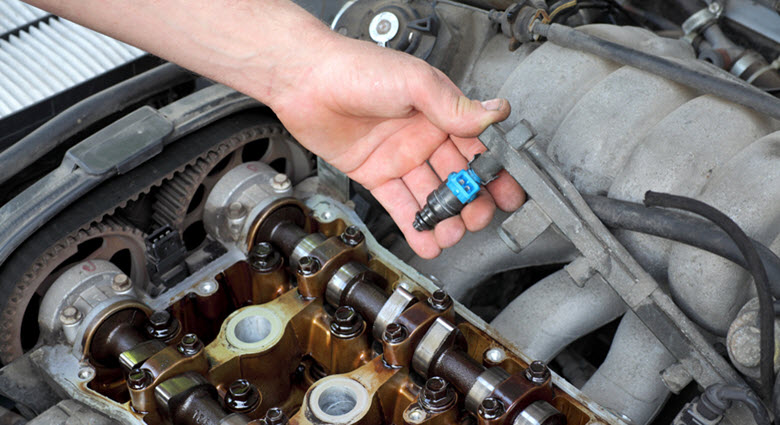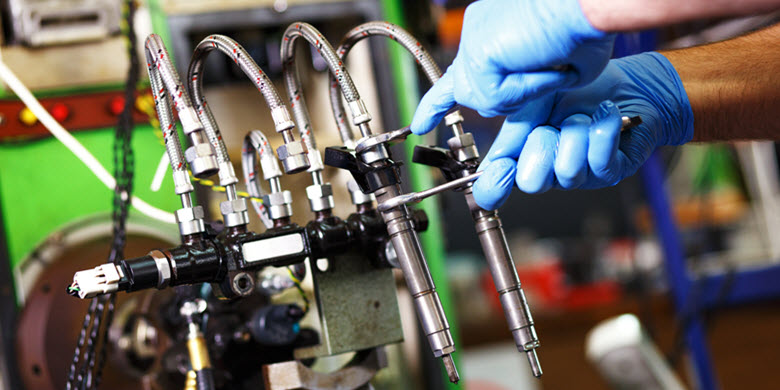Functions of Fuel Injector in Cars

Automobiles are made up of a complex network of parts and systems that work together to make your car “go.” Internal combustion engines, the most common type of automobile engine, run off of fuel injection systems. Over the history of the automotive industry, this technology has evolved to produce more fuel-efficient vehicles. Today, the most common types of fuel injection systems are: gasoline direct injection and indirect injection. If you drive a modern vehicle, chances are that it runs off of one of these two types of injection systems. Unfortunately, these systems are susceptible to damage and wear over time, like most of the other parts and systems your vehicle is made up of. It is helpful to have a basic understanding of what a fuel injection system does in a car, more specifically the fuel injector itself—as this is typically the part of the system that malfunctions when issues arise. Here is how a fuel injector works and what symptoms you may notice when something goes wrong.
Fuel to Air Ratio
In order for your engine to conduct power for movement, a series of events must occur that involve the fuel injection system. An interplay between many different parts, including your accelerator, various sensors, the engine computer, the throttle valve, and of course, the fuel injector, allow the right ratio of fuel and oxygen to combine and create power. This fuel-to-air ratio is critical so that your engine can properly stabilize combustion and create enough power. This is also dependent upon the external conditions you’re driving in, like areas with higher altitude that have less percentages of oxygen in the atmosphere. In other words, in order for the fuel injector to do it’s job properly, other parts measuring the oxygen content must also be working.
How the Fuel Injector Functions
Fuel injectors spray or “inject” fuel into your engine in the proper amount so that the fuel-to-air ratio is adequate for the conditions you’re driving under. This pressurized mechanism, aided by your vehicle’s fuel pump, is designed to make the fuel optimized for combustion so that the process can occur rapidly, within seconds. The fuel injector sprays the gasoline into the engine in a fine mist so that this process is fully optimized. Located in the intake manifold, the fuel injector is electronically monitored, as it communicates with your ECU (engine control unit) and various sensors detecting the percentage of oxygen already present so that it can provide the correct amount of fuel.
What Happens When it Malfunctions?
Failing fuel injection systems, fuel injectors in particular, can cause severe damage to your engine, sometimes even rendering it unusable. It is important to be able to recognize some of the early symptoms of fuel injection damage so that you can take it to an automotive specialist immediately for diagnosis and repair. One of the most frequent symptoms of malfunctioning fuel injection is engine misfiring or lowered vehicle performance. Lowered vehicle performance in today’s vehicles generally refers to hesitation during acceleration or reduced fuel efficiency. These are certainly the beginning symptoms of fuel injector issues, and they can only get worse over time. Fuel injectors can become clogged, causing the release of fuel to be delayed, disrupted, or impeded altogether. Another common symptom of malfunctioning injectors is a noticeable gasoline smell in your vehicle cabin. If the fuel injector is clogged, it can wind up leaking gas at the base of the nozzle or the seal. If you notice a fuel smell or your check engine light appears, you should bring your car in for an immediate inspection.
Our Approach to Fuel Injection Issues
When it comes to fuel injection system issues, the best repair approaches begin with thorough diagnostics. Because fuel injection is a complex process involving many intricate parts, it’s most important to find the source of the issue. At Munich West, we pride ourselves on our attention to detail and our commitment to fixing the problem the first time around. We know that automotive repair can be expensive and an added expense for most households, so we offer affordable pricing for the typical luxury import driver. Serving the areas of Decatur and Atlanta, Georgia, since 1976, we have decades of experience and expertise specifically in European vehicle repair and maintenance. For more information about our services and specialties, contact us today—we look forward to helping your vehicle get back to its optimal performance level.





